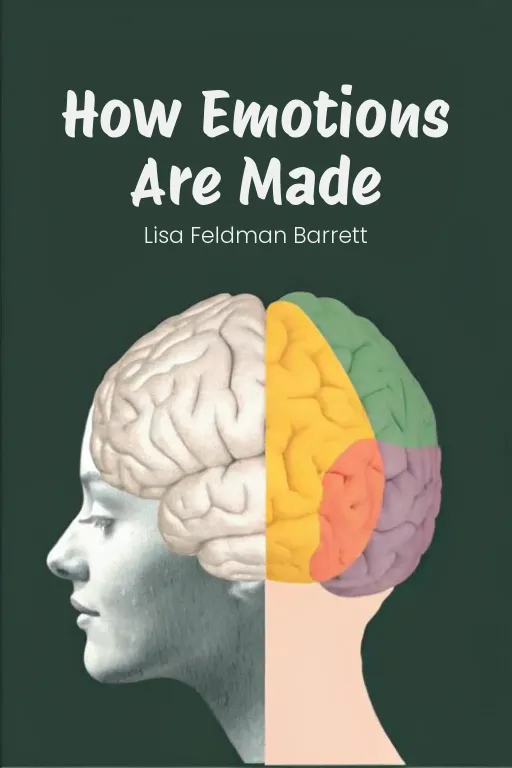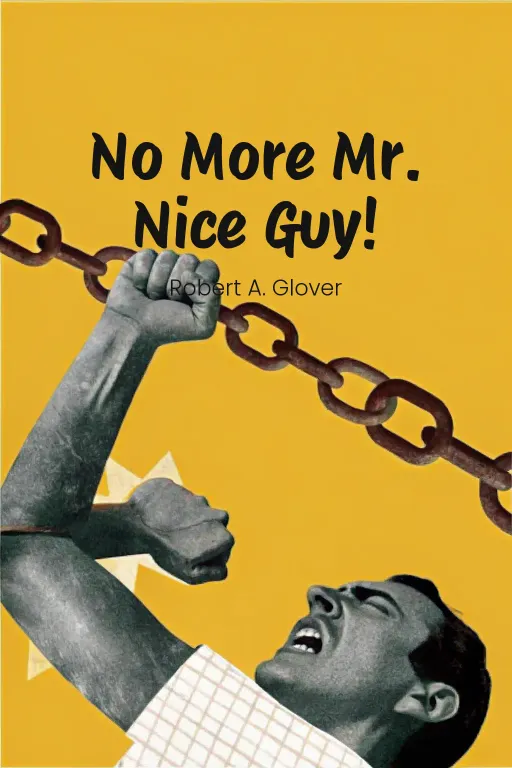
Nice Guy No More: Reclaim Your Power Now!
Podcast by The Mindful Minute with Autumn and Rachel
A Proven Plan for Getting what You Want in Love, Sex, and Life
Introduction
Part 1
Autumn: Hello everyone, and welcome to the show! Let’s jump right in with a question: Have you ever found yourself constantly trying to please everyone, going above and beyond, only to feel like you're being overlooked or even taken advantage of? Rachel: Or, if you're a guy listening, maybe you feel like the world expects you to just handle things silently, you know? Never asking for help, but secretly hoping everyone just gets what you need. Does any of that ring a bell? Autumn: That’s the core of what Dr. Robert Glover explores in his insightful book, No More Mr. Nice Guy! It “really” digs into this pattern of behavior—what he calls "Nice Guy Syndrome"—where men prioritize seeking approval so much that they completely ignore their own needs and desires. Rachel: And the crazy part is, a lot of this stuff is rooted way back in our childhoods, right? Add in societal expectations about what it means to be a man, and boom! You've got this perfect storm of people-pleasing, suppressed feelings, and a whole lot of resentment brewing underneath the surface. Autumn: Exactly! I think the beauty of this book is that it doesn't just point out the problem. It actually offers solutions! Glover gives practical strategies to help men find their way back to themselves, embrace their true masculinity, and build relationships based on honesty, not manipulation. Rachel: So, today we’re going to break down three key takeaways from the book. First off, let's “really” define, what is Nice Guy Syndrome, and where does it all stem from? Autumn: Then, we'll talk about how to actually escape that cycle. And I'll give you a hint: It involves learning to say "no" and being incredibly honest with yourself – emotionally, sexually, and every other way you can think of. Rachel: And finally, we'll get into the good stuff—how to build real, lasting relationships that aren't based on pretending or trying to be someone you're not, but on just being genuinely yourself. Autumn: Consider this conversation your first step toward shedding those old, restrictive expectations and unlocking a more confident, authentic version of yourself. Ready to get started?
Understanding the Nice Guy Syndrome
Part 2
Autumn: Okay, let's dive right in and “really” break down this "Nice Guy Syndrome." Basically, it's about men whose self-worth hinges on being liked and approved of. They've built their whole identity around being agreeable, avoiding conflict, and suppressing their own needs, you know, all in the hope of getting love and validation. Rachel: Wait a second, Autumn. Isn't that just being a decent person? Most people want to be liked, right? So, where's the line between being a kind human being and actually falling into this "syndrome?" Autumn: That’s a brilliant question, Rachel! And that’s where Dr. Glover makes a “really” important distinction. It's not about kindness being the problem. The real issue is when “niceness” becomes a tool, a strategy to get something – love, approval, whatever – and when it comes at a huge personal cost. These "Nice Guys" operate on what Glover calls "covert contracts." They're these unspoken deals where they give in order to receive, but they never actually say what they expect in return. Rachel: "Covert contracts?" Hmm, that sounds a little… manipulative, to be honest. Can you give me a real-life example of how this plays out? Autumn: Sure. Take Jason, the chiropractor in the book. He was so focused on being the "perfect husband" that he completely ignored his own needs. Jason believed that if he always did what his wife wanted, she’d automatically love him back. The problem? He never actually said that was what he wanted from her. He just expected it. And when those silent expectations weren't met, he was left feeling frustrated and resentful. Rachel: So, he was putting on this whole performance, writing the script, assigning roles, and then getting mad when no one followed along. That sounds exhausting for everyone involved! Autumn: Exactly! And that's why Nice Guy Syndrome often breeds resentment. They give and give, thinking it'll "earn" them something, but they're too afraid to voice their desires. When their needs aren't met, they either lash out or withdraw into themselves. Rachel: And this frustration doesn’t just pop up out of nowhere, does it? This sounds like it goes way back to childhood. What makes someone believe their worth is all about pleasing others? Autumn: You’re spot on, Rachel. This behavior often comes from emotionally unstable or neglectful childhoods. Imagine a boy growing up feeling his parents' love is conditional. He learns that to keep the peace, maybe to keep a parent happy or avoid conflict, he has to suppress his feelings and become the "good boy" who meets everyone else’s expectations. Rachel: Let me guess, this doesn't magically disappear when he becomes an adult. Autumn: Not at all. Those childhood survival tactics stick. Take Jose. He grew up in a chaotic home where his parents were unpredictable. So, he learned that being compliant and invisible earned him less criticism or wrath. Fast forward to adulthood, and Jose is still following that script, prioritizing harmony and approval over his own needs. Rachel: And that childhood "people-pleasing" muscle is only strengthened by societal norms, right? Men are constantly told to suppress their emotions – "be a man," "don't cry," "suck it up." It's like society hands them this armor that says, "Showing your needs is a sign of weakness." Autumn: Exactly! It leads to a deep-seated fear of vulnerability. For Nice Guys, being authentic—sharing their emotions, expressing their needs—feels “really” risky. They think it could lead to rejection or conflict, so instead, they become someone they think others want them to be. Rachel: Okay, so we've got a guy who's afraid to ask for what he wants, buries his emotions, and operates on these covert contracts. What kind of toll does all of this take? Because I can’t imagine the cycle is in any way sustainable. Autumn: Oh, it's brutal. Emotionally, it's draining. Many Nice Guys suppress their feelings so much that the only emotions they ever recognize are frustration or anxiety. And it bleeds into their relationships. Look at Todd’s story in the book. He spent years being the one always there for his female friends—supportive, empathetic, the perfect shoulder to cry on. But deep down, he wanted romantic connection. He just never voiced it. When that didn't happen, he was left feeling invisible and unimportant. Rachel: So, instead of asking for a date, he just kind of… hoped his kindness would eventually turn into romance? Oh man. That's not a recipe for real connection; that’s a recipe for a broken heart. Autumn: Exactly. Todd’s fear of rejection kept him stuck in a loop of unmet needs and unspoken desires. Over time, this creates a huge emotional burden—not just on the Nice Guy himself, but on the people around him who might feel the weight of those unspoken expectations. Rachel: You know, I think I'm getting it now. This isn't about being traditionally "nice." It's about authenticity. Nice Guys are so busy being what they think others want that they've completely lost sight of who they “really” are. Autumn: Exactly, Rachel! They’ve abandoned their true selves, all for the illusion of being liked or loved. And here’s the biggest irony—it’s often their very lack of authenticity that pushes people away.
Breaking Free from the Nice Guy Syndrome
Part 3
Autumn: Recognizing these patterns is the first step toward breaking free, and that's where we get to the heart of today's discussion: how do men “actually” break free from the Nice Guy Syndrome? You see, this is where the book shifts from just describing the problem to really offering a path forward that’s transformative. It's all about unlearning those deeply ingrained behaviors and replacing them with healthier, more sustainable approaches to relationships and, most importantly, self-worth. And really, the logic here is crucial: we need to identify the problem before we can find practical steps for personal transformation. Rachel: Sounds like a heck of a challenge, but alright, let's dive in. So, what's step one in this deprogramming process? I'm guessing it's not exactly, you know, "Go on a self-help binge and just hope for the best," right? Autumn: <Laughs> Nope, not quite! One of the first and most foundational steps is embracing personal power. And that really means confronting fears—especially the fear of rejection—and being honest about what you feel and “want”. You know, it sounds simple, but that honesty is terrifying for a lot of Nice Guys because they've trained themselves to avoid it at all costs. Rachel: Right, right. And why is that, exactly? It's because asking for what you want means facing the possibility that someone might say no. Ouch. That's a tough pill to swallow if you've built your entire self-esteem on the idea of being universally liked. Autumn: Exactly, Rachel. Think about Tom, for instance. He was someone who avoided confrontation like the plague. He’d sit through situations that made him bitter or anxious, just because he was terrified of rocking the boat. But you see, through group therapy, Tom started small—he began naming and acknowledging his emotions in a supportive environment. And the incredible thing is that this gave him the courage to make those feelings known in the real world. Rachel: So, there was a moment of reckoning, right? A moment where he had to actually put that honesty into action? Autumn: Definitely. His breakthrough came when he confronted a close friend who had a habit of taking advantage of his generosity. Instead of passively agreeing to yet “another” favor, Tom paused, set a boundary, and explained why he couldn't keep bending over backward. And the result? The friend actually “respected” his boundary—they didn’t lash out, didn’t disown him. For Tom, that moment was a real revelation. What he realized in that moment was that being honest doesn’t always lead to rejection. In fact, it can lead to stronger, more authentic connections. Rachel: Wow, that's quite a plot twist. See, I feel like the average Nice Guy assumes that standing up for themselves will make people angry or just make them leave. But here’s the kicker—when you start asserting yourself, it turns out most people… don’t actually “hate” you for it. Autumn: Exactly! And the real takeaway here is that vulnerability fosters growth. Nice Guys don’t have to start by laying all their emotions bare to the world, though. Think incremental steps—journaling their feelings, identifying what triggers their fears, and practicing direct communication in smaller, safer settings. Rachel: So, basically, emotional honesty is like a muscle. You’ve got to work it out before you start bench-pressing the big stuff, like confronting your boss or having those tricky conversations with a partner. Autumn: Perfect analogy, Rachel. That gradual approach builds confidence and really rewires those old habits. Now, speaking of boundaries—another muscle Nice Guys definitely need to work on—this is step two of the process: learning to set and hold boundaries. Rachel: Ah, boundaries. The thing that feels like a wall to most people-pleasers but is actually more like a gate. It lets the good stuff in and keeps the chaos out. But I’m guessing for a Nice Guy, even the thought of saying “no” feels like breaking some sort of unspoken rule. Autumn: That's so true, and it’s why this step can be so transformative. Boundaries are about reclaiming control over your time, energy, and emotional health. A clear boundary says, "This is where my priorities are, and I respect myself enough to enforce them." Think about Mark, a man who was stuck in a cycle of constant accommodation at both work and home. Everyone leaned on him; he was the guy who never said no. Rachel: And let me guess, this left him completely burnt out, right? What with working basically as everyone else's free emotional and logistical assistant. Autumn: Exactly. But in therapy, Mark uncovered the root cause of his boundary issues: an underlying fear of disappointing others. Once he identified that, his therapist encouraged him to start small. The next time a coworker tried to dump extra work on him, Mark respectfully declined, saying, "I've got my hands full, but I'll reassess once my workload clears." Rachel: So, he didn't just “reject” people, he balanced assertiveness with courtesy. And what happened? Autumn: The response was almost shockingly positive. His colleague accepted it without any pushback. From there, Mark applied the same approach at home, clearly communicating when he needed personal time and space. The results were life-changing. Not only did he feel less stressed and overburdened, but those around him started respecting his boundaries and actually valuing his time more. Rachel: And that's the beauty of it. It’s not just about drawing the line—it’s about teaching people that your time matters, that you matter. I can imagine this spills over into every relationship dynamic. Autumn: Absolutely. Healthy boundaries prevent resentment, which is crucial for fostering reciprocal relationships, right? But that’s impossible if people are just operating in silence, hoping others just pick up on their needs. And this thinking really brings us to step three: dismantling those infamous covert contracts. Rachel: Oh, here we go. The Nice Guy playbook of offering, giving, and sacrificing in the hopes that someone else will magically intuit your deepest, unsaid desires. So what's the first step when it comes to tearing up that unspoken agreement? Autumn: Awareness is key. Most Nice Guys don’t even realize they’re doing this because it’s so ingrained. Let’s revisit Jason’s story—he was the chiropractor whose whole marriage revolved around covert contracts. By constantly putting Heather’s needs first, he'd convinced himself he was being a model husband. But…he was also quietly expecting her to shower him with gratitude and affection in return. Rachel: And that “didn't” happen? I mean, I can definitely see why Heather would feel blindsided—she couldn't exactly read his mind, right? Autumn: Exactly. That lack of communication led to significant resentment between the two. With the help of his therapist, Jason had to learn not just to recognize this covert contract, but to replace it with honest conversations. When he finally addressed how unappreciated he felt and directly asked for more affection, Heather was surprised, but receptive. It opened the door to healthier dynamics built on clarity, not assumptions. Rachel: So, the moral of the story is this: If you want something, say it. People aren’t psychic. What Jason did sounds so simple, but I bet it felt huge for him, like stepping into completely uncharted territory. Autumn: It certainly did. The shift came from realizing that honesty invites connection. Removing those covert contracts eliminates the frustration of unmet expectations and replaces it with mutual understanding. Rachel: Got it. Okay, now here's where things get “really” interesting. Let's talk about the last piece of this puzzle—reconnecting with authentic masculinity. It seems like this step is about more than just redefining boundaries or rejecting covert contracts. It’s about exploring what it means to be a man in a way that feels honest and empowering without falling into tired stereotypes. Autumn: You've nailed it, Rachel. It’s a call to reject those rigid, outdated views of masculinity and instead embrace traits like courage, leadership, and self-respect in ways that align with “individual” identity. One great example from the book is Alan, who initially distanced himself from anything traditionally masculine. But by joining a men’s support group, he learned that activities like team challenges or outdoor adventures weren’t about macho posturing; they were really about connection, self-discovery, and shared growth. Rachel: See, and “that's” such a great realization. Masculinity doesn’t have to look one way on every single person. It can be strong, emotional, vulnerable, and supportive—all at the same time.
Building Healthy Relationships
Part 4
Autumn: So, with this new self-awareness, men can really concentrate on building solid, healthy relationships. This last part looks at how personal growth actually plays out in your relationships, making them deeper and more rewarding. Being true to yourself isn't just about feeling good individually; it's about connecting with others on a much more meaningful level. Let's dive right into one of the biggest obstacles: being emotionally honest and vulnerable. Rachel: Emotional honesty, huh? That’s like kryptonite for Nice Guys. Seriously, it's a complete 180 for someone who's spent their life burying their feelings and steering clear of conflict. So, where do they even begin? Autumn: Well, the first thing is simply acknowledging those emotions. Take Karl, for example, from the book. Remember he was the super successful businessman? He had a hard time connecting with his wife, Danita, because he'd learned as a kid to just shut down whenever things got emotionally intense, thus avoiding emotional turmoil. Whenever Danita was upset, he'd just withdraw, and that only made things worse. Rachel: Right, and he blamed Danita for being “too much,” without even realizing that his silence was a huge part of the problem. That’s almost like pouring gasoline on a fire and then complaining about the heat, isn’t it? Autumn: Exactly. Karl had a breakthrough when he decided to change things up. Instead of retreating, he started actually voicing his feelings in a constructive way. Like, he actually said, “I feel small and unheard when you dismiss my concerns, but I really want us to feel connected.” That vulnerability definitely surprised Danita, but it opened the door for them to really talk. They went from constant fighting to actually understanding each other. Rachel: So, emotional honesty isn't just about word vomiting all your feelings—it's about framing them in a way that fosters connection and caring. Karl wasn’t coming from a defensive position. He approached it openly, wanting to work together. Easier said than done, though, right? Autumn: Definitely takes some courage, especially because Nice Guys are so afraid of rejection. But this kind of honesty is key to building intimacy. When you can clearly explain what you’re feeling and do it respectfully, you make space for trust to grow. Rachel: Okay, so we start with emotional honesty. What about boundaries? Because, let's be real, without boundaries, you're just going to be an emotional open house, sharing way too much with anyone and everyone. Autumn: Precisely, and boundaries are crucial for respect. Nice Guys often think setting boundaries is selfish, but that couldn't be further from the truth. Remember Jake? He always said "yes" to his wife, no matter what, even if he didn’t like it. Over time, his resentment built up, and their relationship suffered. Rachel: Ah, Jake—the classic silent martyr. Let me guess, his wife, Kisha, had absolutely no clue why he was pulling away, right? Autumn: Spot on. She thought he was just losing interest, not realizing it stemmed from his own unmet needs. Jake finally stood up for himself during an argument. Instead of backing down, he calmly said, “I want my voice to matter in these discussions. We both deserve to feel equal.” It was a lightbulb moment for Kisha. They weren't enemies. They just needed balance. Rachel: It’s like Jake rebooted their whole dynamic! His boundary wasn’t a wall; it was his way of saying, "Hey, let’s meet halfway so this feels more balanced for both of us." That’s a big deal. Autumn: Exactly, Rachel. Healthy boundaries aren’t about rejecting anyone—they’re about respecting your own needs while still considering the other person. And the result? More genuine relationships that don’t bubble with hidden anger. Rachel: Speaking of that hidden anger, let's talk about covert contracts. Because from where I'm sitting, these unspoken agreements are the silent killers of any healthy relationship. Autumn: Oh, absolutely. Covert contracts are textbook Nice Guy Syndrome, and they cause so many problems. Think about Todd. He spent years building emotional connections with women he secretly liked, hoping they’d somehow realize he was the perfect match. But he never actually told them he was interested. Rachel: That's like writing a rom-com in your head without giving the other person the script. Poor Todd was setting himself up for disappointment every time. Autumn: Exactly. He recognized this pattern and learned to be direct. He started putting his feelings into words instead of relying on people to read his mind. It was a huge change, and it meant he could approach relationships with more clarity and less drama. Rachel: So, the takeaway is simple, but not easy: If you want something—romance, respect, affection—just say it. People can't read minds. Autumn: And that’s true for all relationships. The more transparent and open you are, the stronger your connections become. Rachel: Which brings us to reciprocity, the idea that relationships should be a two-way street, not some one-sided emotional circus act. Autumn: Exactly. Healthy relationships need effort from both sides. Nice Guys often fall into the trap of giving too much without asking for anything in return, and that leads to burnout. Take Jose, who felt totally drained because he was doing all the “emotional heavy lifting”. Rachel: Yeah, he was stuck in “fixer” mode, trying to keep the peace at all costs, even by sacrificing his own emotions. What was his turning point? Autumn: Eventually, he talked to Julia, his partner, and said, “I feel like I’m carrying most of the emotional load here, and I need us to share this.” That honesty prompted Julia to step up, and their relationship became more balanced. Rachel: It’s like Jose stopped being the supporting actor in his own life and finally became an equal co-star. That's a massive shift. Autumn: It really is, Rachel. And all these things—honesty, boundaries, transparency, reciprocity—they all lead to the main goal: breaking free from harmful habits. Rachel: Ah, the heart of the matter: childhood scripting. So this is where all the baggage comes from, huh? Autumn: Absolutely. For many Nice Guys, their relationship problems come from unresolved issues with their parents or caregivers. Alan's story is a great example. He kept going after emotionally unavailable partners because it matched his relationship with his mother. Rachel: And breaking free meant completely rewriting that script, right? Instead of looking for validation from other people, he had to find it within himself first. Autumn: Exactly. Alan’s journey involved acknowledging the unmet emotional needs of his childhood and learning to enter relationships from a place of self-worth, not dependency. It was life-changing—not just for his love life, but for how he saw himself. Rachel: And that’s the irony: Nice Guys think they're being selfless, but real relationships need both people being authentic—flaws, needs, and all.
Conclusion
Part 5
Autumn: Alright, so to recap, we've “really” dug into the Nice Guy Syndrome, right? We talked about how it stems from this need to please everyone, these unspoken, secret agreements we make, and just a general suppression of what we actually want. We looked at where it comes from, like childhood experiences and even societal pressures. And then, of course, we went over some ways to break free, like being more emotionally honest, setting those crucial boundaries, getting rid of those covert contracts, and, honestly, just rethinking what it means to be a man. Rachel: Right, and I think the real core of it is this: It's not about not being nice, it's about recognizing when being nice is just a way to dodge conflict or avoid being disliked. The real stuff, the self-worth that actually matters, that comes from being genuine, not from chasing after everyone else's approval. Autumn: Precisely, Rachel. And for anyone listening who's thinking, "Wow, that sounds like me," the big question to ask yourself is this: Are you truly living as who you are, deep down? Or are you just playing a role, being the version of yourself that you think is the easiest to love? Rachel: And hey, once you've answered that, maybe it's time to start saying "yes" to yourself a little more often. And, you know, maybe throw in a few strategically placed "no's" along the way for good measure. Autumn: Perfect way to put it. Thanks for listening, everyone! Here's to building connections that are more real, more balanced, and more true to who we “really” are—both with others and, most importantly, with ourselves.









